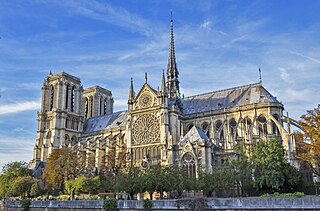
Notre-Dame de Paris, referred to simply as Notre-Dame, is a medieval Catholic cathedral on the Île de la Cité, in the 4th arrondissement of Paris, France. The cathedral, dedicated to the Virgin Mary, is considered one of the finest examples of French Gothic architecture. Several attributes set it apart from the earlier Romanesque style, particularly its pioneering use of the rib vault and flying buttress, its enormous and colourful rose windows, and the naturalism and abundance of its sculptural decoration. Notre-Dame also stands out for its three pipe organs and its immense church bells.
Notre Dame, French for "Our Lady", a title of Mary, mother of Jesus, most commonly refers to:

The term Black Madonna or Black Virgin tends to refer to statues or paintings in Western Christendom of the Blessed Virgin Mary and the Infant Jesus, where both figures are depicted with dark skin. Examples of the Black Madonna can be found both in Catholic and Orthodox countries.

Notre-Dame de la Garde, known to local citizens as la Bonne Mère, is a Catholic basilica in Marseille, France, and the city's best-known symbol. The site of a popular Assumption Day pilgrimage, it is the most visited site in Marseille. It was built on the foundations of an ancient fort at the highest natural point in Marseille, a 149 m (489 ft) limestone outcropping on the south side of the Old Port of Marseille.
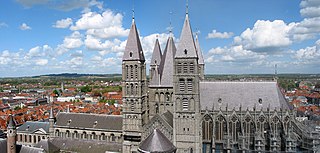
The Cathedral of Our Lady, or Tournai Cathedral, is a Roman Catholic cathedral, see of the Diocese of Tournai in Tournai, Belgium. It has been classified both as a Wallonia's major heritage since 1936 and as a World Heritage Site since 2000.

Marseille Cathedral is a Roman Catholic cathedral, and a national monument of France, located in Marseille. It has been a basilica minor since 1896. It is the seat of the Archdiocese of Marseille.
Our Lady of Sion School is an inter-denominational, independent school for male and female students, founded in 1862 and located in Worthing, West Sussex, on the south coast of England.

Notre-Dame Cathedral Basilica of Saigon, officially Cathedral Basilica of Our Lady of The Immaculate Conception is a cathedral located in the downtown of Ho Chi Minh City, Vietnam. Established by French colonists who initially named it the Church of Saigon, the cathedral was constructed between 1863 and 1880. The name Notre-Dame Cathedral has been used since 1959. It has two bell towers, reaching a height of 58 meters (190 feet).
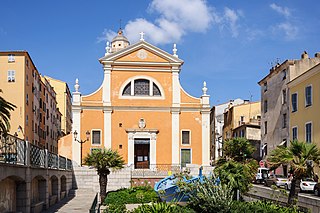
Ajaccio Cathedral, officially the Cathedral of Our Lady of the Assumption of Ajaccio and also known as the Cathedral of the Assumption of Saint Mary, is a Roman Catholic church located in Ajaccio, Corsica. The cathedral is the ecclesiastical seat of the Bishop of Ajaccio, a suffragan of the Archdiocese of Marseille. It is dedicated to the Virgin Mary, and is in the Baroque/Mannerist architectural style.
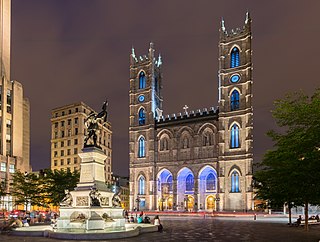
The Notre-Dame Basilica is a basilica in the historic district of Old Montreal, in Montreal, Quebec, Canada. The church is located at 110 Notre-Dame Street West, at the corner of Saint Sulpice Street. It is located next to the Saint-Sulpice Seminary and faces the Place d'Armes square.
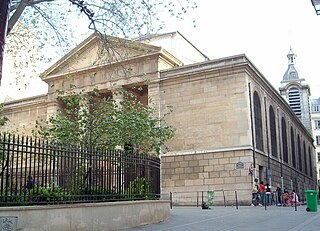
Notre-Dame-de-Bonne-Nouvelle, located at 25 Rue de la Lune, in the 2nd arrondissement of Paris and is a Catholic parish church built between 1823 and 1830. It is built in the Neoclassical style, and is dedicated to Notre-Dame de Bonne-Nouvelle, referring to the Annunciation. The neighbourhood of Bonne-Nouvelle, the Boulevard de Bonne-Nouvelle and the Bonne Nouvelle metro station are named after it. The church was registered as a national historical monument in 1983.

The Église Notre-Dame de l'Assomption is a Roman Catholic parish church of the town of Rouffach in southern Alsace. It is one of the largest medieval churches in the Haut-Rhin département of France. The church is also known as Saint-Arbogast Church . It lies on the "Route Romane d'Alsace". Although work started in the 11th century and was carried on with interruptions until 1870, the building remains unfinished.

Notre-Dame de la Daurade is a basilica in Toulouse, France. It was established in 410 when Emperor Honorius allowed the conversion of pagan temples to Christianity. The original building of Notre-Dame de la Daurade was a temple dedicated to Apollo.

The 16th arrondissement of Marseille is one of the 16 arrondissements of Marseille. It is governed locally together with the 15th arrondissement, with which it forms the 8th sector of Marseille.

The Église Notre-Dame-du-Mont is a Roman Catholic church in Marseille.
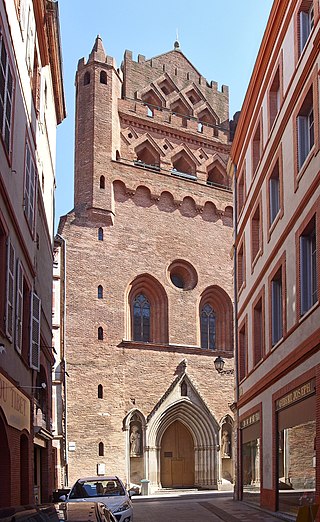
Notre-Dame du Taur is a Roman Catholic church located in Toulouse, France. According to legend, the edifice was built on the exact spot where the body of Saint Saturnin (Sernin), patron saint of Toulouse, became detached from the bull that dragged the martyr to his death. The church stands in the rue du Taur between the Capitole and the Basilica of St. Sernin. It has been classified as a historic monument since 1840.

The Basilique Notre Dame du Bon Secours, Marie Auxiliatrice is a Roman Catholic minor basilica in Bonsecours near Rouen, Seine—Maritime, France. It is the first church in France to be built in the Gothic Revival style. The basilica is highly ornately decorated with windows, sculptures and other elements often carrying the name or coat of arms of a patronal donor.
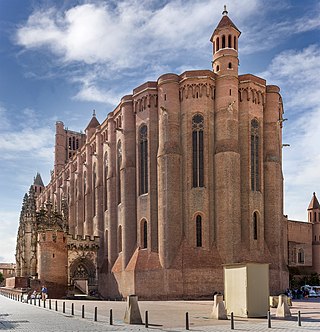
Southern French Gothic, or Meridional Gothic, is a specific and militant style of Gothic architecture developed in the South of France, especially in the Toulouse region. It arose in the early 13th century following the victory of the Catholic church over the Cathars, as the church sought to re-establish its authority in the region. As a result, church buildings typically present features drawn from military architecture. Taking into account the Cathars' criticism of the Catholic Church, Southern French Gothic is simpler and less ornate than northern French Gothic, and further differs in that the construction material is typically brick rather than stone. Over time, the style came to influence secular buildings as well as churches and spread beyond the area where Catharism had flourished.

Notre-Dame de Germigny-l'Exempt is a Roman Catholic church in the town of Germigny-l'Exempt in Berry, France. It was built in the 12th century in the Romanesque architectural tradition.


















